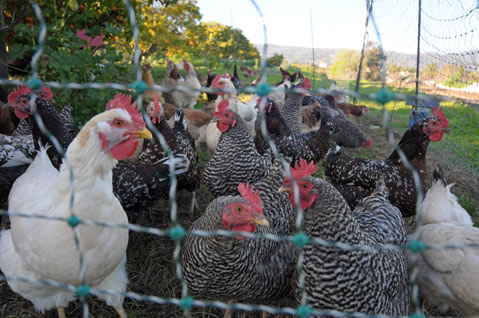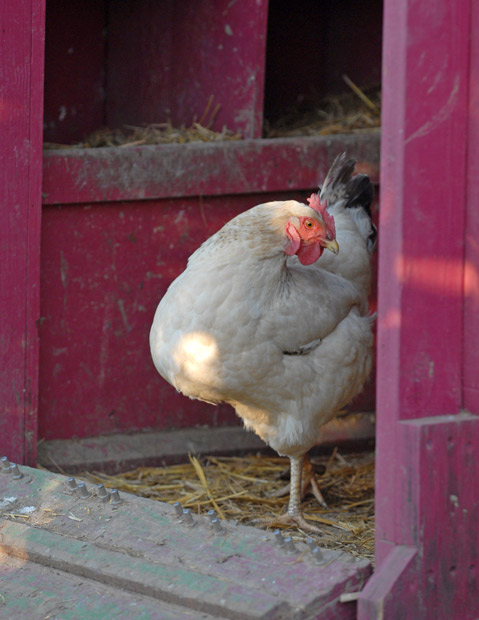Backyard Chicken Keeping 101
Fairview Gardens and Quail Springs Permaculture Offer Class on Chicken Keeping

Everybody has memories of their favorite family pet. But what if this animal also could contribute fresh eggs for your kitchen and aid in pest control, fertilization, and weed management in your garden? Chickens are the perfect permaculture pets, and backyard chicken keeping has become a popular avenue for suburbanites to partake in animal husbandry.
“Chickens are the greatest nutrient returners; it’s a marvelous cycle,” said Brenton Kelly, livestock manager for Quail Springs Permaculture. Chickens are perhaps the world’s best and friendliest natural fertilizers: Their manure has high levels of nitrogen, phosphorus, and potassium and acts as an environmentally friendly, more effective alternative to synthetic fertilizers.
“When you bring poultry into the backyard, the compost gets that much more enriched,” continued Kelly. “It’s great for the environment and a healthy, organic garden.” In addition, they love to gobble up garden snails, slugs, and many other pests.

“They are curious little beasts,” Kelly said. “Chickens are a flocking social organism; birds like to be with other birds … they will pine for social engagement.”
When buying chickens for a small backyard flock, it is best to start with five to six birds. The basic requirements for a coop consist of a minimum of 2-3 square feet per chicken inside the henhouse and 5-6 square feet per chicken in an outside run. This amount of space ensures enough room for each chicken and for the flock to function in harmony. Since chickens are popular with predators, another key consideration is their security, particularly against our raccoon population. It’s important to keep the coop protected with wiring small enough that no animal can claw or dig through, preferably 1/2″ or smaller.
While chickens’ life span is variable, they are best for egg laying between 2 and 3 years old, when they may lay nearly 300 eggs a year. Backyard chicken eggs are very nutritious, containing seven times the beta carotene, three times the vitamin E, and two times the omega-3 fatty acids of conventional eggs, as well as nearly one-third the cholesterol. Additionally they contain less saturated fat and more vitamin A.
In terms of feeding, chickens do best on greens (including compost waste). At Quail Springs Permaculture, chickens are given all the farm’s kitchen scraps to encourage an understanding of integrated waste management.
Goleta’s Island Seed & Feed is a great spot to find the supplies to get started. Since 1988, Island (formerly co-owned by Kelly) has sold thousands of chickens, how-to guides, organic feed, nest boxes, and feeders to happy homesteaders. Birds are usually available until August/September, after which fall and winter months slow down (and stop) egg production. For optimal growth, the best time to purchase your birds is spring.
Fairview Gardens has become a leader in educating the community about backyard chicken keeping with classes and welcoming students in summer camps and field trips. Working alongside Leadership Santa Barbara County, Fairview is in the process of building and fundraising for a new, larger coop that will take in 125 chicks this year.
“We give kids and their parents a chance to connect to something real,” said Fairview Gardens Executive Director Mark Tollefson. “Kids absolutely love chickens; they are totally fascinated.”
As Kelly said, “Whenever I establish a relationship with a living thing, it’s magic. It goes back to the origins of humanity; it’s a part of something that needs to be here far into the future.”
4•1•1
The Center for Urban Agriculture at Fairview Gardens will host a Backyard Chickens class as part of its Sub-Urban Homesteading series. Led by Kelly and his wife, Jan Smith, of Quail Springs Permaculture, the class will take place at Fairview Gardens Saturday, May 4, 9 a.m.-1 p.m., and will cover the basics of backyard chicken keeping. Cost is $50. To sign up, visit fairviewgardens.org or call (805) 967-7369.



